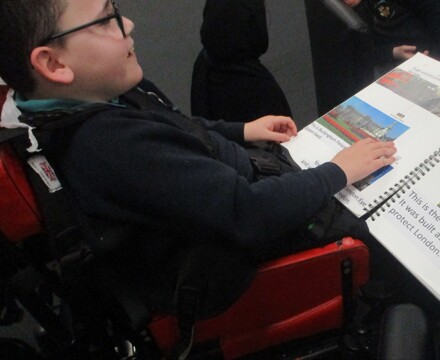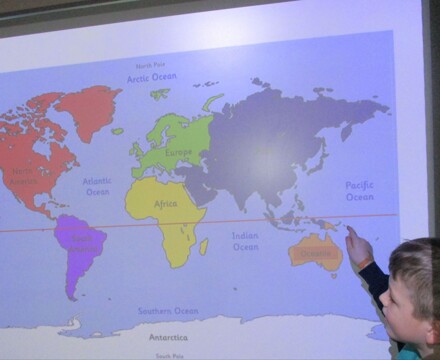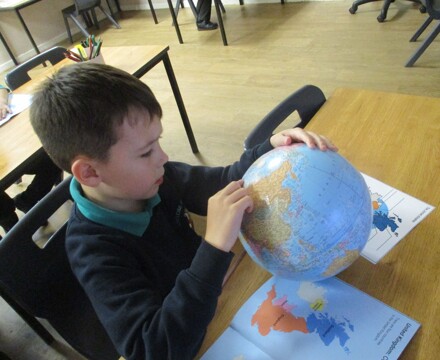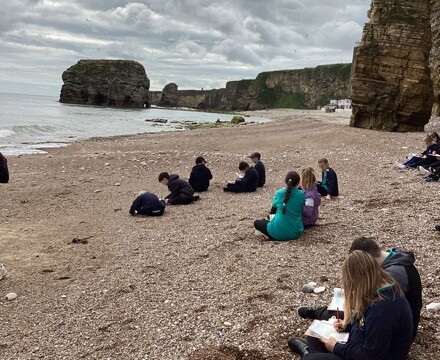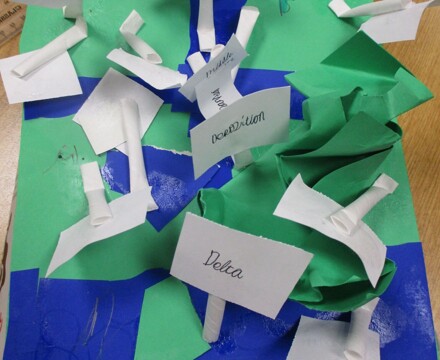- Home
- In the Classroom
- Subject Information
- Geography
Geography
BackVision and Aims
At Oxclose Primary Academy, we firmly believe that our children should be inspired to cultivate curiosity and a geographical mindset, empowering them to become confident and informed global citizens. We believe that Geography is a key subject that helps our pupils make sense of the world around them, understand their place within it, and develop essential skills for life.
At Oxclose Primary Academy, our Geography curriculum aims to ensure that all pupils:
- develop a deep understanding of geographical concepts, processes, and relationships, both within the classroom and through outdoor learning experiences.
- foster a curiosity and enthusiasm for the world we live in, encouraging children to ask questions, explore, and investigate the complexities of the Earth's physical and human systems.
- equip pupils with the skills and knowledge to navigate and understand the world's diverse cultures, environments, and geographical features.
- promote a sense of place and identity, enabling pupils to appreciate the local area, its history, and its significance.
- develop the skills of observation, critical thinking, problem-solving, and effective communication through the use of geographical concepts and fieldwork techniques.
Sequencing Rationale
Units have been devised to be progressive
- R/Y1 focus on geography of the school
- KS1 focus on local area/UK
- Lower KS2 focus on UK/Europe
- Upper KS2 focus on World
- In Year 3 children begin with a skills unit on mountains before completing a unit on volcanoes
- In Year 5, children study ‘The Americas’ before completing a unit on rainforests (with a focus on The Amazon). This is then built upon in Year 6, where the children find out why Brazil has one of the fastest growing economies.
Key themes and threads help to identify and develop links. They also help pupils make links to wider initiatives. We want pupils to understand that Geography is not just a subject in school but impacts on their everyday life. Our key themes are:
- My Place in the World
- Interconnectivity
- Sustainability
- Locality Comparison
Extraordinary Opportunities
Visits:
Reception: The Farm/People Who Help Us visitors
Year 1: The Local area (Map skills)
Year 4: The River Wear (River Study)
Year 5: Marsden Grotto (Coastal Erosion)
Intent
At Oxclose Primary Academy we believe that pupils should be given the opportunity to develop geographical skills whilst deepening their knowledge about the world they live in. Across their time in primary school, we want pupils to have the opportunity to learn about their local area, geographical features of countries/areas of the world and geographical concepts, such as the water cycle, volcanoes and earthquakes.
We feel that it is important for pupils to have the opportunity to develop skills both using concrete resources within the class and through outdoor geographical experiences. Across both key stages, it is important that pupils are able to improve their knowledge across the key geographical areas of locational and place knowledge, human and physical geography and geographical skills and fieldwork.
We believe that by allowing our pupils to gain these skills and deepen their knowledge it will help them throughout the rest of their lives.
Implementation
Geography is one of our driver subjects within school and the Geography Long Term Plan follows the National Curriculum. Medium Term Plans have been written by the subject leader ensuring they include local geography. Each Medium-Term Plan starts with a key question to support pupils in developing their enquiry skills.
There are 3 termly units for each year group and lessons are taught weekly. Across Key Stage 1 and 2, the National Curriculum identities four main strands of Geographical knowledge; Locational Knowledge, Place Knowledge, Human and Physical Geography and Geographical Skills and Fieldwork. These elements are taught across both Key Stage 1 and 2 and are planned for progression.
Within the Geography curriculum, we aim to develop both substantive knowledge (locational knowledge, place knowledge, human and physical processes and geographical skills) and disciplinary knowledge (how geographers think and interact with these key ideas). Sticky knowledge is identified for each unit of work, this is the knowledge we want pupils to be able to know, and remember, both during the teaching of the unit and after.
When mapping the curriculum for place knowledge, we focus on branching out. In Early Years we look at the geography of their classroom, this is extended if/when pupils’ interest is focused on the local area; this develops to the local area in Y1; The United Kingdom in Y2, counties of the UK in Y3, Europe in Y4, North and South America in Y5 and the World in Y6. This helps the pupils to develop a sense of place.
Assessment will take place across lessons, at the end of each unit and across the school year. Each geography lesson will begin with an Oxclose Memory Grid starter (OMG), which will be used as retrieval practice. Pupils will be expected to be able to recall key sticky knowledge both within the teaching sequence and after the unit has been covered. Pupils will also complete activities to identify what they now know that they didn’t know previously.
Impact
Pupils will be able to confidently discuss, and demonstrate all aspects of the geography curriculum that they have been covering and will show appropriate key geographical skills. They will have knowledge of locational and place knowledge, human and physical geography and geographical skills and fieldwork. Pupils will be able to retain the knowledge, even after the unit they have been covering. Key sticky knowledge from across the unit will be retained.
To enable us to measure the impact, the subject leader and senior leaders will use lesson visits, work scrutinies and pupil voice activities across the year.
| Subject Documents |
|---|
| Geography Long Term Plan |
| Substantive and Disciplinary Knowledge Overview |
| Example Geography Medium term Plan |
